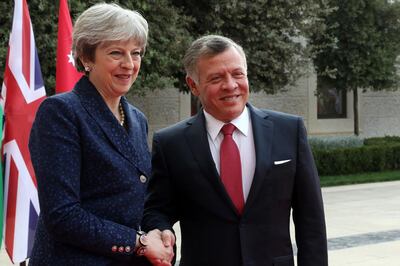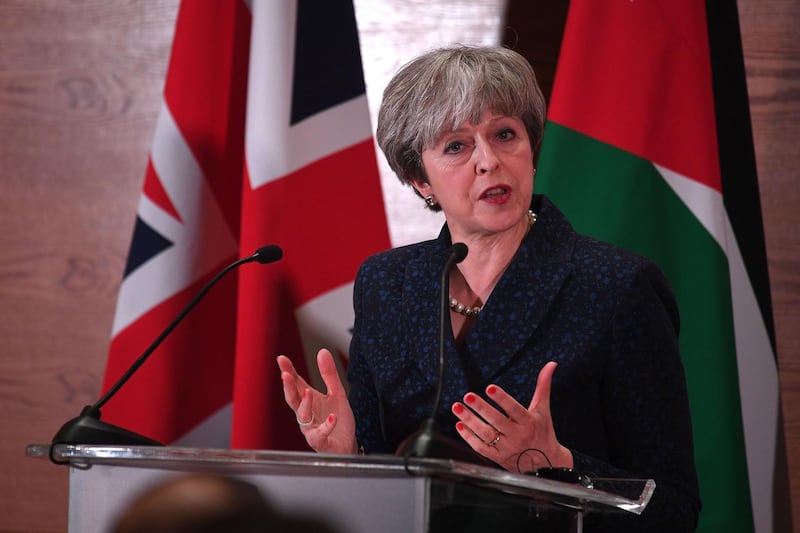Britain’s Prime Minister Theresa May has used a trip to the Middle East to strengthen ties with Western allies in the region, as the UK prepares to leave the European Union.
The prime minister travelled to Jordan at the end of her three-day visit addressing an audience including Jordan’s prime minister, Hani al-Mulki, and much of his cabinet on Thursday afternoon.
The Arab nation, which has been a major destination for refugees fleeing the conflict in Syria and Iraq, is a key ally of the West in the fight against ISIL.
_______________
Read more:
[ Theresa May to seek post-Brexit opportunities for British business on Riyadh visit ]
[ Arab foreign ministers in London commit to safeguarding humanitarian access to Yemen ]
[ Aid supplies arrive at Hodeidah port in Yemen ]
_______________
Mrs May said the aim of her visit was to expand current ties, which focus largely on security, and to "move that into a long-term relationship on the economy and economic development."
“We are making a new, ambitious and optimistic offer of partnership to support that strength and resilience for the long-term,” she said.
“A partnership that supports your security, helping you defend and protect your borders and your people from external aggression. A partnership that goes further in seeking to resolve the ongoing violence and political tension across the region. Not just containing current conflicts - but resolving them and in so doing increasing the resilience of the region.”
Jordan’s economic growth has been weakened by high youth unemployment, which has risen above 30 per cent, coupled with the influx of refugees from the region, prompting fears the economic situation could cause political instability.
Mrs May met Jordanian King Abdullah II on Thursday morning who said support from Britain to "strengthen our resilience of the economy will be very critical."
He said that on political issues, the two nations were “on the same page”.
Mrs May travelled to Amman from Riyadh, where she had met King Salman of Saudi Arabia and the Crown Prince, Mohamed bin Salman on Wednesday evening for talks on Yemen, Iran and Vision 2030.

The prime minister condemned Houthi militia for firing missiles earlier this month in Yemen during her speech in Jordan and called on a stronger response to Iran, who is believed to have supplied the rebels with missiles.
“We must therefore strengthen our response to Iran’s ballistic missile programme and its proliferation of weapons. This includes in Yemen, where it is unacceptable for the Houthis to fire missiles at Riyadh,” Mrs May said.
“In my meeting in Riyadh last night with Crown Prince Muhammed bin Salman I agreed that we would increase our work with Saudi Arabia to address this. I welcome the ongoing UN investigation into the source of the missiles and the international community must be resolute in its response to the findings.”
However, Mrs May reiterated Britain’s support for the Iran nuclear deal, which was put into place in October 2015.
"We must stand firm in our support for the deal," she told reporters.
Mrs May’s position puts her at odds with US President Donald Trump, who has called the pact the “worst of its kind” ever negotiated by a US administration.
During her visit to the kingdom on Wednesday, the prime minister urged Saudi Arabia to fully reopen the key port of Hodeida to allow the flow of commercial and humanitarian aid through to the people of Yemen.
"The prime minister made clear that the flow of commercial supplies on which the country (Yemen) depends must be resumed if we are to avert a humanitarian catastrophe," Mrs May's office said on Thursday.
"They agreed that steps needed to be taken as a matter of urgency to address this."
Yemen, one of the poorest nations in the Arab world, is currently facing a humanitarian crisis after Houthi rebels ousted the internationally-recognised government of president Abdrabu Mansur Hadi.






